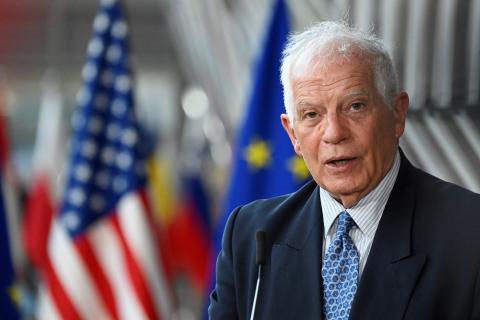
The Gulf Cooperation Council this week hosted an important session of political dialogue with the EU that focused on the evolving security situation in the two regions. Two issues dominated the discussion: The repercussions of the Ukraine war and the need to work together to counter Iran’s regional activities and nuclear proliferation.
The EU and GCC foreign ministers met in Brussels on Feb. 21, three days before Russia’s invasion of Ukraine. The two sides had been in discussions for some time about upgrading their relationship to a “strategic partnership,” adding a more active political role and extensive security cooperation. The looming crisis then added a sense of urgency to the meeting of the 33 nations and they adopted a five-year Joint Action Program reflecting the new priorities.
There was a subsequent meeting in New York last month, on the sidelines of the UN General Assembly, which stressed accelerated implementation of what was agreed in Brussels.
While the Ukraine war was undoubtedly a factor, there were other reasons underscoring the need to reenergize and upgrade the EU-GCC partnership. They included Europe’s energy crisis and a shared recognition of the need to mitigate the war’s consequences and beef up regional security to safeguard trade routes and food supply chains.
The Ukraine war has exacerbated Europe’s energy crisis and brought back a level of insecurity along its eastern borders not seen since the fall of the Berlin Wall in 1989 and the dissolution of the Soviet Union in 1991. The post-Cold War period of more than 30 years was marked by peace at home, close energy cooperation with Russia and complacency about potential security threats.
The newly discovered vulnerabilities have led to greater political cohesion and security integration in Europe and across the Atlantic, while also underscoring the EU’s new desire for security cooperation outside its borders. When France assumed the bloc’s rotating presidency in January 2022, it proposed a new security vision. President Emmanuel Macron called for a stronger security framework internally and a more active role externally. He said that the EU should not be satisfied with merely reacting to international crises and called for the speedy formation of a rapid reaction force to defend the EU’s external borders. Then-French Foreign Minister Jean-Yves Le Drian added that “we need to make proposals aimed at building a new security and stability system in keeping with our collective security interests,” in coordination with NATO and the US.
The war in Ukraine has shelved for now any talk of “strategic autonomy” and similar ideas popular before the war. Instead, Europe’s new emphasis is on maintaining its internal security while strengthening its external partnerships. Instead of reacting to crises and problems after they reach its borders, it wants to play more active global and regional roles, including in the Gulf, Yemen, Iraq, Syria, Lebanon, Libya and elsewhere.
GCC countries share many of Europe’s security concerns and, as such, their partnership could address those concerns more effectively. For example, both sides are concerned about the security of trade routes and food and energy supply chains. The Gulf region is home to about 50 percent of global oil and 20 percent of gas reserves. It produces and exports significant shares of both. It can help Europe deal with shortages and rising prices. But if there are disruptions in the region, energy supplies and prices will be affected around the world, including Europe.
Because of their geographic proximity, regional crises affect the Gulf countries and Europe directly and indirectly. The GCC and EU share a preference for employing softer tools in such situations. They advocate dialogue and political solutions and stand ready to provide generous humanitarian and development assistance when needed. Greater GCC-EU cooperation could help address those crises more effectively, whether in Palestine/Israel, Syria, Lebanon, Libya, Iraq, Yemen or Afghanistan.
Combating terrorism, human trafficking and illegal migration are among the priorities of both sides. Cybersecurity has also become a greater priority for both and their ties can be further enhanced by joint action between the two regions.
Maritime security is a rising concern for both sides; they need to coordinate their efforts on the security of water passageways and shipping lanes to combat arms smuggling, human trafficking and organized crime. Both have an interest in extending their present collaboration to the Red Sea.
The two blocs have also demonstrated great concern about Iran’s destabilizing role in the region and its nuclear, ballistic missile and drone programs. The EU has staked its diplomatic reputation on saving the Joint Comprehensive Plan of Action nuclear deal, but Tehran has so far made it impossible to accomplish that job. Instead, it has chosen to continue to develop its program way beyond peaceful needs and the limits of the JCPOA, while raising demands to be freed of its Non-Proliferation Treaty obligations.So, at this week’s Riyadh meeting, modalities for enhanced partnership in addressing all these issues were discussed. Both sides are aware that, at times, they may have different priorities or modus operandi, but regular dialogue will help align them as much as possible and allow the two blocs, or some of their member states, to work in unison on issues they agree on.
The main emphasis should be on practical work on areas of common interest and priority. Debate on unbridgeable differences should not stand in the way of joint action on agreed matters. Time is of the essence; officials and experts should not spend too much time fine-tuning frameworks and implementation instruments. Instead, practical work should be prioritized and the perfection of the tools will happen by itself in due course.












